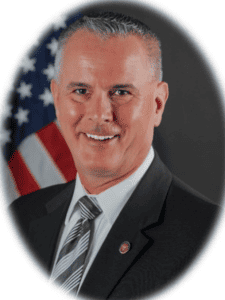While civil libertarians and the law enforcement community debated the merits of asset forfeiture — the seizure of property and/or cash allegedly involved with certain criminal activity — the discussion eventually centered on competing House and Senate bills to reform the law in Kansas.
In the Senate Judiciary Committee hearing, legislators and witnesses discussed recommendations from an advisory committee that met last summer and a joint House-Senate Committee that in December offered a reform package that included:
- Upgrading the standard of proof required for forfeiture to “clear and convincing evidence”
- Legal representation for those accused of a crime
- A jury trial to determine guilt
- Conviction of a crime before asset forfeiture can be commenced
The bill under consideration is SB 458.
Samuel MacRoberts, Litigation Director of the Kansas Justice Institute, which, like The Sentinel, is owned by the Kansas Policy Institute, argued asset forfeiture is ineffective at preventing crime and often victimizes innocent people, citing research from the Institute for Justice:
“The number of defaults in Kansas are extraordinarily high. People who had their property seized by the government give up. About 70% of Kansans just give up trying to fight the forfeiture case. Why do we have defaults? Our position is the reason these defaults exist is because it’s incredibly hard to navigate the system, especially for people who don’t have lawyers. Our core position is it’s too easy for the government to take your property.”

Greg Glod with Americans for Prosperity agreed and added AFP was also in favor of jury trials to determine guilt if the government intended to deprive someone of their property. He said the Supreme Court of Indiana recently upheld such trials as constitutional and believed the U.S. Supreme Court would as well if the issue came before that body.
Opponents support asset forfeiture reforms in HB 2606
Deputy Attorney General Dan Burrows led the witnesses in opposition to SB 458 with a message from his boss and an endorsement for a rival piece of legislation:
“The attorney general supports reform of our civil asset forfeiture, but what he supports is currently embodied in House Bill 2606. With think civil asset reform is necessary because civil asset forfeiture is an important tool, but it is easily abused and there has been near constant attention to this issue from this legislature since 2017. The time to act is now, and the bill to act upon is the one currently pending in the House.”

Kansas Bureau of Investigation Director (KBI) Tony Mattivi also endorsed the House legislation over that in the Senate because: “I believe it applies thoughtful, measure, reasonable restrictions to the Kansas asset forfeiture law that provide an additional layer of due process for the hypothetical innocent owner who has property seized.”

The director added: “I’m testifying in opposition to this bill (SB 458) because of the provisions that go beyond what are in the House bill which, in my view, are unworkable and perhaps even counterproductive to what folks are trying to accomplish with regard to shortening the current amount of time for an innocent owner to get their property back.”
Representatives of the Kansas Sheriffs’ Association, the Kansas Association of Chiefs of Police, the Kansas Peace Officers Association, and the Kansas Highway Patrol also spoke in opposition to SB 458, citing what they saw as restrictions on the effectiveness of law enforcement to address major crimes such as drug and human trafficking.
Committee Chair Sen. Kellie Warren questioned Director Mattivi and Sedgwick County Sheriff Jeff Easter if there were any studies showing asset forfeiture prevented crime. Neither could cite any, but Director Mattivi

countered that seized property, by its nature, could not be used for criminal activity in the future.
Sen. Warren asked Jason Thompson of the Office of The Revisor of Statutes to explain the differences between SB 458 and HB 2606. Thompson explained that SB 458 contained:
- Outlawing “Federal Adoption”, the transferal of state seizure cases to the federal government, in most cases. The bill denies that authority to some 400 law enforcement agencies in the state
- Jury trials to determine guilt for those accused in seizure cases
- Requiring financial reports provided by KBI to different legislative bodies



